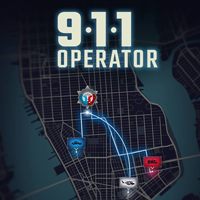911 Operator Review – Emergency Dispatch Center Simulator
Being an emergency dispatcher is a highly responsible post, as proven by the game from a small Polish dev team. While it may be hard to remain focused during longer sessions, 911 Operator is definitely worth your time.
The review is based on the PC version.
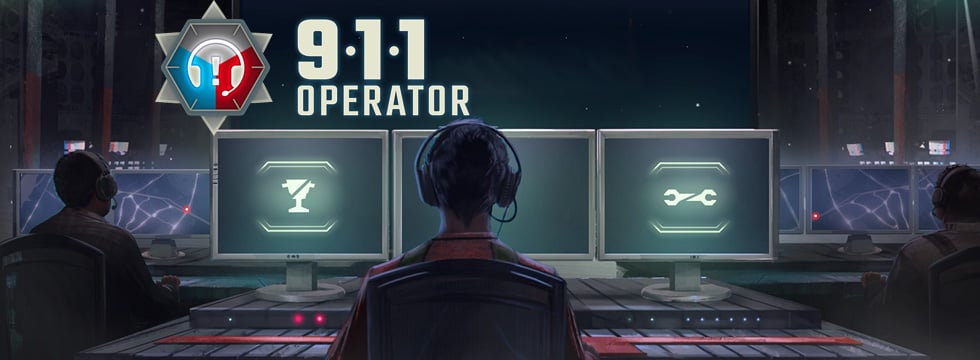
- Unique, nicely-implemented theme;
- The first few hours are enthralling;
- Well-polished;
- Well-written phone call dialogues;
- Clear, intuitive interface;
- Easy rules;
- Shifts can be really intense.
- Becomes repetitive after a few dozen shifts…;
- …resulting in increasingly boring gameplay;
- Sometimes dispatched units choose less-than-optimal routes.
If I were to create a list of the world’s most responsible and stressful jobs, beside a flight controller, a surgeon or a judge it would have to include a 911 dispatch operator. There’s no denying that a candidate for this post needs to be a person of many skills – they have to be competent, cool-headed, inquisitive, and highly adaptable; able to simultaneously process many factors and instantly make the right decision. In other words, a one-man band. You can taste a substitute of those intense emotions and constant stress courtesy of 911 Operator, a game from the Polish developer Jutsu Games.
911 Operator is in fact the first game from Jutsu Games to be released on a broader scale. Their only other game up to now was an obscure mobile production Modern Wizards, making 911 Operator the first large-scale project from the Polish developer.
Compared to the flood of various, often bizarre, simulation games, the game from the sort-of-debuting Polish developer provides an interesting breath of seriousness. The stakes are high, there’s no shortage of work, the dispatched units are coming and going without a moment’s rest, and sometimes we feel like we’re really dealing with a prank call from some bored punk.
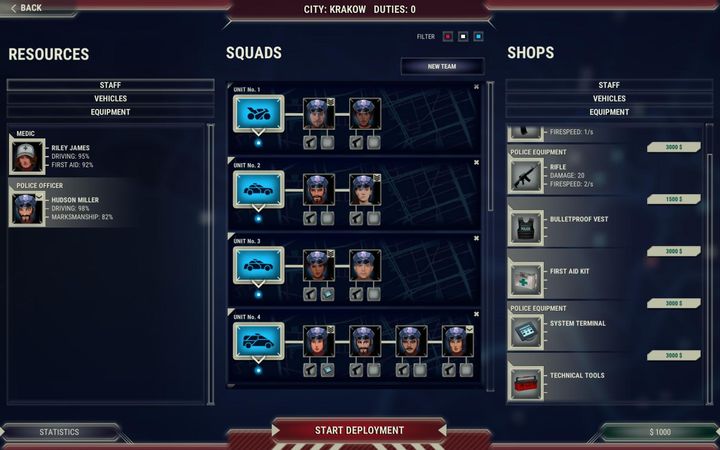
9-1-1, what is your emergency?
The premise of 911 Operator is very simple – the player becomes an emergency dispatcher, takes a place in a dispatch center, and sends out various units in response to emergency calls. There are three ways we can learn of an emergency – through a call from a witness, or sometimes the perpetrator, through a direct notification, or through a report from one of our patrolling units. Our task is to help with solving as many emergencies as we can. Within the bounds of rational judgment, that is, as not all situations require an emergency dispatch and not all callers are able to judge whether it’s 911 they needed to call.
The game features two gameplay modes – the story campaign enables us to work shifts in dispatch centers of six cities, including New York, San Francisco and Chicago, among others. What’s interesting, the street and medical infrastructure grid remains faithful to its real-file counterpart – I can already see the fans of realism and precision rejoicing. Obviously, it would be quite impossible to recreate the entire area of a large metropolis, not to mention the fact that we have more than enough work to do even with just a portion of it.
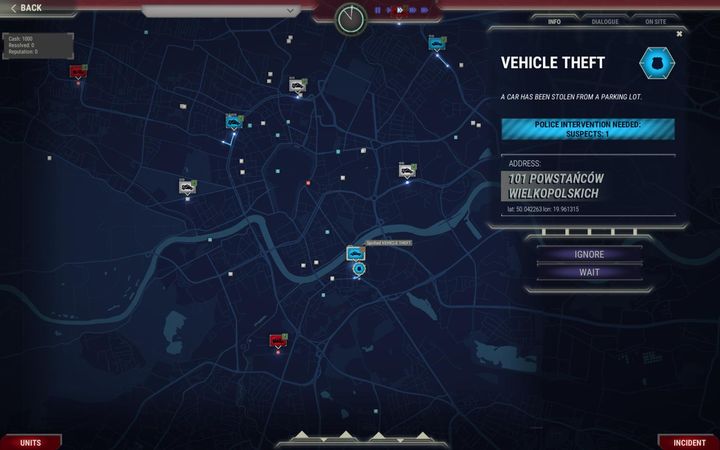
The other option, the free mode, looks no less interesting – it enables us to download virtually any city map available in the OpenStreetMap collection. This means that we can perform our duties in numerous cities all around the world. It should be noted that all of them have carefully recreated transportation grids and locations of emergency facilities, enabling us to send our units to real-life locations we may even know ourselves.
Proper Planning Prevents Poor Performance
Before we see some action, though, we have to prepare the units that later participate not only in routine patrol schedules but also in various emergency situations. The player takes command of three types of vehicles: police, firefighting, and medical. In total, the game offers more than a dozen vehicles: bikes, police cars, vans, ambulances and helicopters. Each of them is characterized by different speed, passenger capacity, and crew number. Depending on our budget, we should try to diversify our machine park, increase its numbers, and make sure our men and women have the best equipment we can afford – policemen won’t do much without guns and bulletproof vests, and firefighters could sure use that sweet new set of power tools.
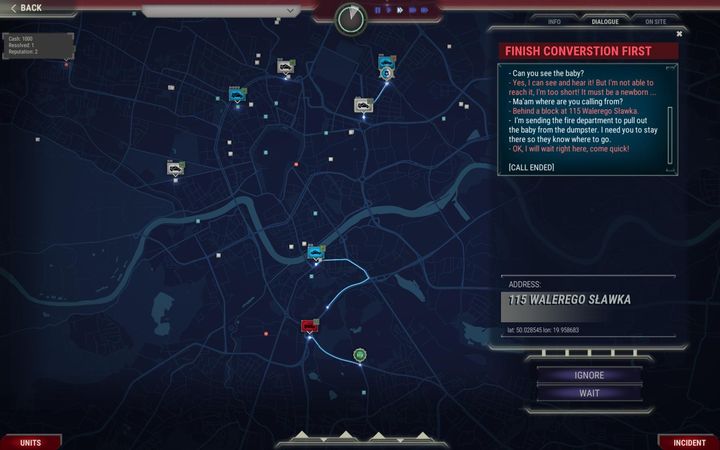
To make a shift possible, not to mention it being effective, it is essential to station our units in the right places across the city map. Leave them in default locations, e.g. near their bases, and you can be sure that after a dozen minutes or so you’ll be running a funeral company instead of an emergency dispatch center. Initial deployment of your units is critical to effective operation – and although the units will soon scatter across the city, keeping tabs on their positioning is the key to success. Success, which is counted in reputation points, awarded for every successful action.
Having won the Best Indie Game award during last year’s Digital Dragons conference in Krakow, 911 Operator was anything but unanticipated. In my opinion, the trust that was placed in the developers was well invested.
The gameplay itself is very simple – from time to time, various events appear on the map, their color informing us of the type of emergency and the type of unit that needs to respond. At least that’s how things look with the neat, organized reports that come from the central – all we have to do is pick a unit on the map and send it to deal with the situation. Things get complicated when all we get is an emergency call. It is never clear whether the caller really is in need of an emergency response team. Yes, a significant portion of the calls feature actual emergencies, actions to save lives and property in the face of unexpected events, but sometimes people call to report things that could be dealt with by an auntie next door.
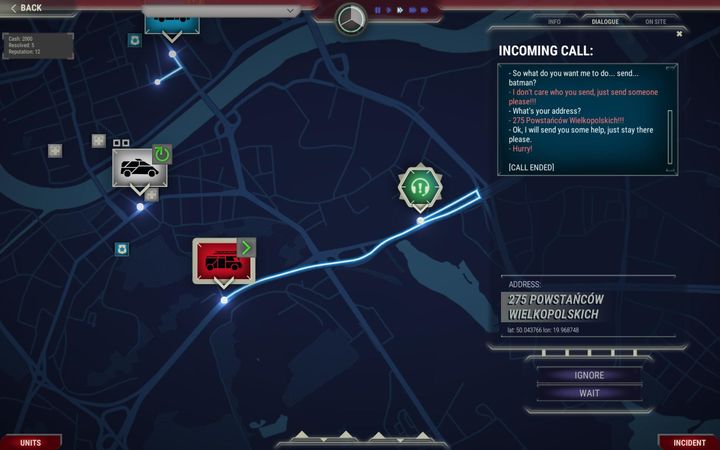
Smooth operator
Our decision determines whether the right units will be dispatched. Often, we need to investigate and hunt for details in order to learn the true nature of an incident, enabling us to dispatch the right unit. Our conversations with callers take place by choosing dialogue options – often three, each focusing on completely different aspect of the event. Our task becomes to get all the necessary information or, in some cases, to guide the caller so they can safely resolve the situation themselves. That’s how a “car theft” turns out to be a case of illegal parking where the caller’s car has been towed away and an “upset stomach combined with unimaginable headache” becomes, after a short recap of the previous evening, a common hangover. The more inquisitive we are, the bigger the chances for avoiding a dispatch and saving our units for a truly dangerous scenario.
The things that can happen during our shift can be very diverse – we may have to deal with brawls in public space, fires, theft, traffic accidents, as well as health issues and accidents resulting in body trauma. The list also includes car chases, where the thieves or roadhogs run through the city, crossing every red light they can find. It may seem like there’s an impressive number of various emergencies in the game, but several hours in and we see that most of them differ only in details, becoming rather repetitive. After my 10th or 15th shift it has become a standard procedure to ask a “bellyacher” whether they ate something fishy, or if it’s just the usual hangover. I also know that when a lady calls to report a home quarrel at her neighbor’s house, it will soon enough become a case of gunshot wound, and that roughly 70% of people lying on the sidewalk are simply drunk.
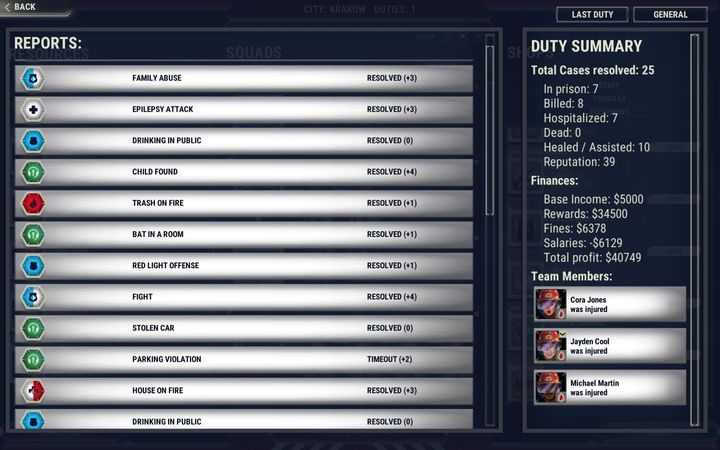
That said, it’s not like nothing interesting ever happens in the flood of routine dispatches, it’s just that it happens rarely, and when listening for the hundredth time to the same scenario things are bound to become a bit boring. We have, let’s say, a traffic accident. Here’s my set of questions: Where? When? Any casualties? Is access possible? A patrol is on the way, thank you, come again. A brawl? Sure thing: Where? How many people? Any casualties? Please wait for the unit to arrive. That’s the pattern for most cases. I know – it’s only a video game, life can be much more unpredictable, and that can be hard to recreate in virtual reality. On the other hand, though, it is the dev’s job to keep the player interested long enough for them to feel satisfied. And that’s the problem with this game, especially in the long run.
Dispatch, are you sure this is the right way?
When it comes to technical aspects, the title from Jutsu Games doesn’t leave much, if anything, to be desired – the interface is very intuitive and user-friendly, maps are clear, and the route markings and windows reporting the course of an intervention are expository enough. Nothing bad can be said of dialogues either – various conversations during the calls have been well enacted, often providing a touch of realism with background noise, which sometimes can be heard through the receiver in addition to the panicked caller.
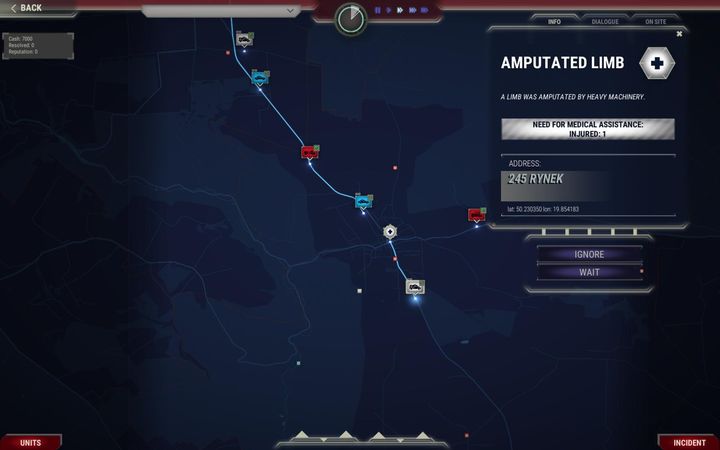
Some of the dialogues can get surprisingly creative. One of my favorite scenarios has a construction worker calling, speaking broken English that is nigh impossible to understand, as he tries to report an accident that befell his fellow worker. The thing is, his English skills are hardly impressive, effectively sabotaging his desperate efforts, and the harsh-sounding words flying in the background suggest that we may be dealing with Poles. The situation takes place in Chicago, known for its large Polish minority. Here’s a funny, yet not unrealistic, nod from the game’s Polish devs.
What I need to point out as an issue, however, is the AI pathfinding. Once we dispatch them, our AI-controlled units sometimes tend to pick the most outrageous of all possible routes if we order them to head for the emergency site on their own, based only on destination point. This happens most often on highways, where they like to take long scenic drives completing as many loops and turns as they can. Yes, officer, this certainly is a nice neighborhood, but we have a suspect running away in a red sedan! It’s much better to provide them with detailed instructions, assuming we’ve got the time. The problem is, time is often the one thing we lack.
Just another day at the office
Yes, there’s no hiding the fact that there’s a lot going on in this game. It’s not like our part is limited to receiving a call, dispatching a unit, and waiting for things to wrap up smoothly. Nuh-uh, often we’ll be required to intervene mid-emergency, sending in additional police units to a shootout, additional ambulances to a brawl, or making sure a downed officer gets delivered safely to the nearest hospital. Especially later in the game, subsequent emergencies are springing up like mushrooms, while we are trying to deal with all the 911 emergency calls. There’s really a lot on our plate, but, as I’ve already said, most of it are things we’ve already done before in some form.
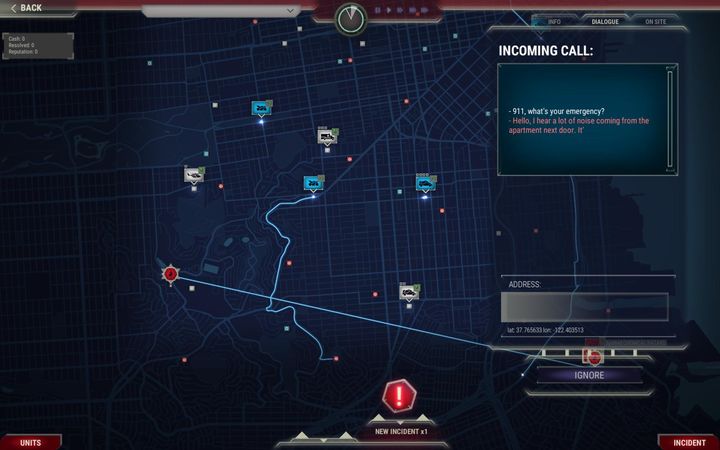
And you know what? This must be the first time when it’s so hard for me to give a game its final score. On one hand, we have a very creative title, rather serious in its depiction of the theme it tackles, and well-polished, on the other – the game gets repetitive in the long run, and has some minor AI issues. The team at Jutsu Games has delivered a truly original game, although almost every aspect of it could use a bit more of something. A bit more cars, a bit more emergency services, a bit more interesting missions, a bit more diversified dispatches and callers… That said, the fact that I’d like for the game to improve, serves, I think, for a decent recommendation in itself. If you’re set on spending long hours playing 911 Operator, you’re better off finding something else to do. If, however, you’re looking for a game to play in between some other titles, and are interested in the promised expansions, you’ll find yourself pleasantly surprised, just as I was. And just like me, you may find pleasure in picking up a virtual receiver to help some distressed citizen.
ABOUT THE AUTHOR
I’ve spent several dozen shifts in 911 Operator, dispatching units across several cities, unlocking all locations in career mode and trying my hand at free mode, which equals roughly 5 hours of playtime.
I was born and raised (sometimes even razed) on various simulations. I like to try out games no one else is willing to pick up – which tend to be simulators for most of the time, but that’s another story. My time with 911 Operator was a pleasant experience, in contrast to many modern so-called “simulators”.
911 Operator
911 Operator Review – Emergency Dispatch Center Simulator
Being an emergency dispatcher is a highly responsible post, as proven by the game from a small Polish dev team. While it may be hard to remain focused during longer sessions, 911 Operator is definitely worth your time.

